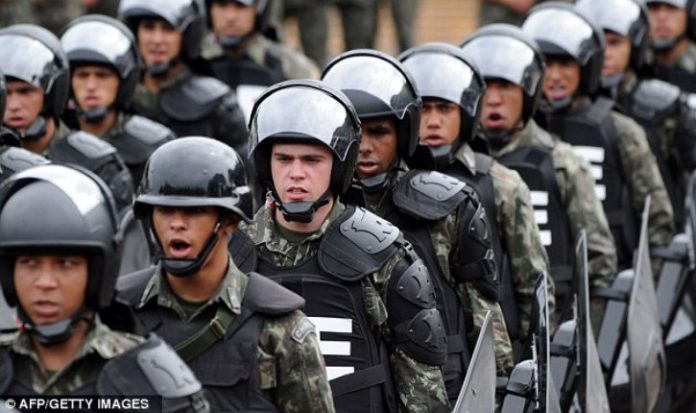
What if law enforcement officers worldwide all knew BJJ at, let’s say purple belt level? Moreover, what if they didn’t have guns with them and had to actually rely on their grappling prowess? Now, this wouldn’t really be appropriate for any type of police officers, but it is more than enough for riot squads and the like. Actually, Brazil already had it tested, by forming a Police Jiu-Jitsu squad to handle world cup protest. I think there’s a lot to learn from their experiences.
Specialized police Jiu-Jitsu squads tasked with handling specific situations, like protest and the likes are not just a great idea – they’re an essential one. Such a squad would be highly proficient at close quarter situations, which almost exclusively involve unarmed and untrained folks on the other side. BJJ is the perfect skill for law enforcement officers to execute their duties in a safe manner both for them, and the people they’re arresting. Let’s face it, police forces are not going anywhere anytime soon, so why shouldn’t at least they be properly trained to handle situations, rather than end up causing drama and heartbreaks?
A Case For Mandatory BJJ For Police Officers
This has been a subject that has been beaten to death, and we’ve discussed it as well right here on BJJ World. There’s just no good reason not to have police officers train Jiu-Jitsu. In fact, anyone that has to work with restraining or tussling with people should train grappling. In fact, it should be a requirement that law enforcement officers have at least a certain level of Jiu-Jitsu knowledge in order to have the right to work. It is a daunting task, I know, but it is also something that I have no doubt will save lives – both those of police officers and civilians alike.
With the aftermath of George Floyd’s murder still reigning throughout the USA, and with support coming in from all parts of the world, this subject is more important than ever. The latest incident involving police officers that were poorly or completely untrained in grappling showed just how bad things can end. With mandatory police Jiu-Jitsu training, I am certain such a tragedy would’ve been avoided. And not just this one.

The Sao Paolo Police Jiu-Jitsu Squad
Brazil has it right on so many levels. The beaches, surfing, those cocktails, and of course, Brazilian Jiu-Jitsu. Those are just some of the best things that Brazil has to offer the world. On a more serious note, though, Sao Paolo is the city that might just have figured out the perfect formula for police riot squads.
Back in 2014, the World Cup in Soccer took place in Brazil, and it wasn’t a popular choice among the local residents. Everything, from bus fares to food became much more expensive with the majority of populations struggling as it was. That led to protests in the streets that turned into riots. However, Sao Paolo had special squad ready – one trained in special police Jiu-Jitsu tactics.
Learning a lesson from the violent clashes in France in 2005, the Sao Paolo officials had 140 officers trained in Brazilin Jiu-Jitsu for an extended period of time. That proved crucial even before the World Cup. The‘” Tropa do Braço”, or “Troop of Arms” managed to handle a demonstration of more than 1.500 people without weapons and injuries. Moreover, Brazil’s famous elite unite BOPE is also known for having a huge number of BJJ black belts among its members.
Using a trained “Police Jiu-Jitsu squad” meant that the number of officers needed to secure the demonstrations was cut in half. Moreover, during 262 arrests, the injuries sustained by both civilians and police officers were extremely low and largely insignificant compared to previous experiences.
BJJ In Law Enforcement Around The World
It is not just Brazil that has realized the potential of having mandatory police Jiu-Jitsu training for their officers. In Japan, having a black belt in Judo is a must for anyone looking to work in certain police units. In Shanghai, there’s a Law Enforcement Program. It has police officers training BJJ in order to provide them with extensive sills for arresting and restraining suspects.
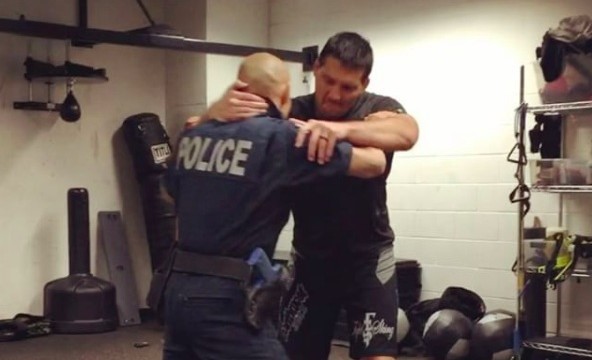
In a police academy in the US, cops spend about 4 weeks working on combat skills. Anyone that has trained Jiu-Jitsu knows that it is not nearly enough to learn, let alone be able to use anything in a real-life situation.
There is a nationwide movement form police officers themselves to make Jiu-Jitsu and grappling training mandatory across the US. In light of recent events, this needs to happen sooner rather than later. In fact, it is already late.
Final Words
Police jiu-jitsu training is something that’s blatantly obviously missing from police curriculums in most countries. It doesn’t have to be a special unit like in the case of Sao Paolo. In fact, every officer needs to know BJJ. It is as simple as that. Every arrest made in a proficient and effective manner significantly reduces the risk of injury to both the officer and civilian in question. What will it take to make BJJ a part of every officer training?


![Darce Choke Encyclopedia – Origins, Mechanics and Variations [2025] BJJ, choke, Brabo, BJJ Darce Choke, D'arce Choke, Darce BJJ Choke](https://bjj-world.com/wp-content/uploads/2017/11/JungPoirierLeeYahoo-218x150.jpg)






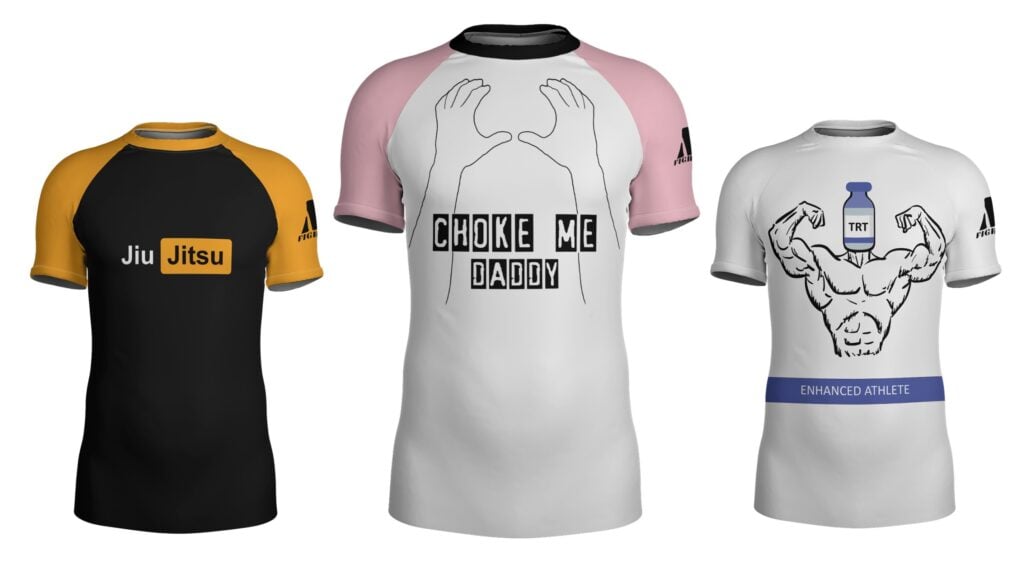


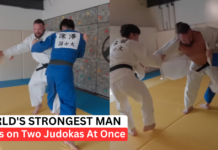
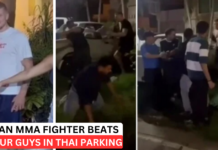
![Slicin’ Calves Mikey Musumeci DVD Review [2025] Slicin' Calves Mikey Musumeci DVD Review](https://bjj-world.com/wp-content/uploads/2025/04/slicin-calves-mikey-musumeci-dvd-review-218x150.png)
![Jiu-Jitsu For Old Guys Guard Retention Bernardo Faria DVD Review [2025] Jiu-Jitsu For Old Guys Guard Retention Bernardo Faria DVD Review](https://bjj-world.com/wp-content/uploads/2025/03/old-guys-guard-retention-bernardo-faria-dvd-review-218x150.png)
![X-Guard Trickery Kyle Sleeman DVD Review [2025] X-Guard Trickery Kyle Sleeman DVD Review](https://bjj-world.com/wp-content/uploads/2025/03/x-guard-trickery-kyle-sleeman-dvd-review-218x150.png)
![Countering with Crab Ride Anthony Budion DVD Review [2025] Countering with Crab Ride Anthony Budion DVD Review](https://bjj-world.com/wp-content/uploads/2025/03/countering-with-crab-ride-anthony-budion-dvd-review-218x150.png)


![Baseball Chokes From Everywhere Magid Hage DVD Review [2025] Baseball Chokes From Everywhere Magid Hage DVD Review](https://bjj-world.com/wp-content/uploads/2025/01/baseball-chokes-from-everywhere-magid-hage-dvd-review-100x70.png)

![Heavy Top Game Fabiano Scherner BJJ DVD Review [2025] Heavy Top Game Fabiano Scherner BJJ DVD Review](https://bjj-world.com/wp-content/uploads/2025/01/heavy-top-game-fabiano-scherner-bjj-dvd-review-100x70.png)
![Osoto Gari for Jiu Jitsu Jackson Nagai DVD Review [2024] Osoto Gari for Jiu Jitsu Jackson Nagai DVD Review](https://bjj-world.com/wp-content/uploads/2024/10/osoto-gari-for-jiu-jitsu-jackson-nagai-dvd-review-100x70.png)




![How To Knee Cut Junny Ocasio BJJ DVD Review [2025] How To Knee Cut Junny Ocasio BJJ DVD Review](https://bjj-world.com/wp-content/uploads/2025/02/how-to-knee-cut-junny-ocasio-bjj-dvd-review-100x70.png)
![Understanding The Distance On Top Gui Mendes DVD Review [2024] Understanding The Distance On Top Gui Mendes DVD Review](https://bjj-world.com/wp-content/uploads/2024/10/distance-on-top-gui-mendes-dvd-review-100x70.png)
![No-Gi Defense Xande Ribeiro DVD Review [2024] No-Gi Defense Xande Ribeiro DVD Review](https://bjj-world.com/wp-content/uploads/2024/11/no-gi-defense-xande-ribeiro-dvd-review-100x70.png)

![Breaking Their Guard Mikey Musumeci DVD Review [2025] Breaking Their Guard Mikey Musumeci DVD Review](https://bjj-world.com/wp-content/uploads/2025/02/breaking-their-guard-mikey-musumeci-dvd-review-100x70.png)
![Spider and Lasso Guard Jared Welman DVD Review [2025] Spider and Lasso Guard Jared Welman DVD Review](https://bjj-world.com/wp-content/uploads/2025/01/spider-and-lasso-guard-jared-welman-dvd-review-100x70.png)
![No-Gi Grapplers Guide To Front Headlock Joel Bane DVD Review [2025] No-Gi Grapplers Guide To Front Headlock Joel Bane DVD Review](https://bjj-world.com/wp-content/uploads/2025/03/no-gi-front-headlock-joel-bane-dvd-review-100x70.png)




![Edging Yourself Out Of Danger Craig Jones DVD Review [2024] Edging Yourself Out Of Danger Craig Jones DVD Review](https://bjj-world.com/wp-content/uploads/2024/12/edging-yourself-out-of-danger-craig-jones-dvd-review-100x70.png)
![Mastering Control From Top Position Trent Hidlay DVD Review [2024] Mastering Control From Top Position Trent Hidlay DVD Review](https://bjj-world.com/wp-content/uploads/2024/11/control-from-top-position-trent-hidlay-dvd-review-100x70.png)



